Most adventurers choose between Everest Base Camp (EBC) and Advanced Base Camp (ABC) when planning a trek in the Everest region. Both are famous places but provide very different experiences in altitude, distance, and challenges.
The EBC Trek is ideal for hikers who seek great views and a cultural experience in the Khumbu area. EBC is also a great destination for hiking and trekking enthusiasts.
The trek to Advanced Base Camp on the other hand goes further up the mountain, taking even more energy and planning. Climbers and trekkers aiming for the Everest expedition or reaching the summit use the ABC route.
Knowing the differences between Everest Base Camp Vs Advanced Base Camp can help you choose the right challenge for your adventure.
Whether you like the easy beauty of EBC or the tough challenges of ABC, both camps provide unforgettable experiences in the amazing surroundings of Everest.
Understanding Altitude Differences: Everest Base Camp vs Advanced Base Camp
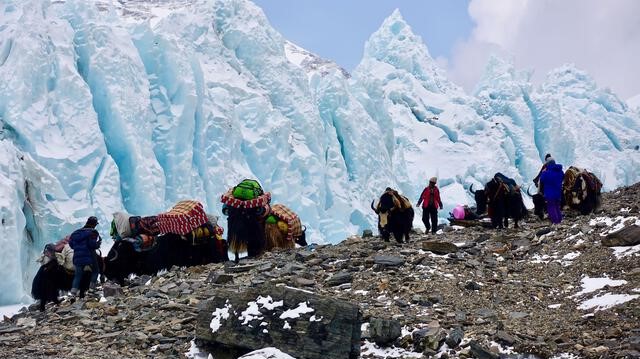
Trekking to Everest Base Camp is quite a different experience from going to Advanced Base Camp. The main difference between these camps lies in the altitudes, which alter trekkers’ performances and feelings. The higher the altitude, the more challenging the journey becomes.
Altitude of Everest Base Camp
Everest Base Camp is around 5,364 meters (17,598 feet) high. It is located on the southern side of Mount Everest in Nepal. This height is very high and can be difficult for the body to cope with.
There, at such altitudes, the oxygen levels drop, and it becomes tough to breathe. Trekkers get easily tired, and sometimes even suffer from headaches. The light air makes climbing slower, and more exhausting. Staying at this high place for too long can lead to altitude sickness.
Trekkers should rest and get their bodies used to the surrounding environment. This acclimatization is important for trekkers to prevent sickness while trekking in the low oxygen area. Therefore, most trek plans have rest/acclimatization days for that purpose.
Altitude of Everest Advanced Base Camp
The altitude of Everest Advanced Base Camp Advanced Base Camp is at a higher altitude, at approximately 6,400 meters (21,000 feet), on the north side of Mount Everest in Tibet. The high altitude makes this trek much harder than EBC.
The air at ABC is thinner, with very little oxygen. This can bring about bad altitude sickness if trekkers are not careful. The weather is also tougher, with freezing winds and sudden snowstorms.
Trekkers to ABC must be well prepared. They need the right equipment and should acclimatize their bodies. It is riskier at that altitude, but the reward is the panoramic views of Everest’s north face. Comparing EBC and ABC highlights how altitude changes everything on a trek.
Trekking Distances and Routes to EBC and ABC
Trekking to Everest Base Camp (EBC) and Advanced Base Camp (ABC) is via different routes and covers varying distances. Both trips take you through beautiful scenery but are very different in-ground type, height, and planning.
Everest Base Camp: Distance and Route
The Everest Base Camp Trek begins from Lukla, famous for its small airstrip. It leads into Sagarmatha National Park, a UNESCO World Heritage Site, exhibiting wonderful vistas and part of Sherpa culture. Major stops along the way include the busy town of Namche Bazaar, Tengboche Monastery, and the small village of Gorak Shep.
The trek is about 130 kilometers (80 miles) for the round trip and takes 10-12 days to finish. Trekkers go up slowly, which helps them get used to the altitude. The trail includes green forests, suspension bridges, and beautiful views of Everest and nearby mountains.
Mount Everest Advanced Base Camp Trek: Distance and Route to
ABC is on the northern side of Mount Everest, in Tibet. Starting at Rongbuk Monastery, a place that is far away yet gives a clear view of the tall front of Everest. The route is shorter than the EBC trek but reaches a much higher height, with ABC located at an amazing 6,400 meters (21,000 feet).
Trekkers pass through vital points such as the Interim Camp and the North Col, where the terrain is uneven and rocky. Even though it is shorter in terms of distance, it still demands excellent physical fitness and cautious acclimatization to high altitude. The trip to ABC is more remote with few services but provides a basic, very impressive experience at high altitudes.
Challenges of Trekking to Everest Base Camp vs Advanced Base Camp
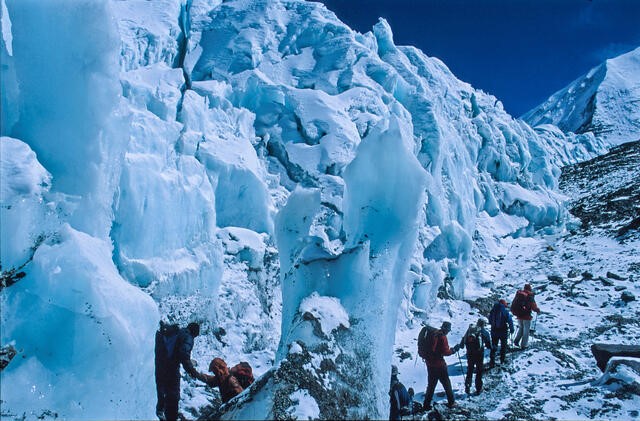
Everest Base Camp vs Advanced Base Camp: Since both expeditions can be quite demanding in their respect, the difference lies in the degree of difficulty due to the nature of the terrain, altitude gain, and weather conditions.
Physical Demands of EBC Trek
Physically, the EBC Trek is challenging but quite doable by most fit trekkers. Here’s what to expect:
- Elevation Gain: You ascend gradually up to 5,364 meters (17,598 feet). The trek considers time for acclimatization to reduce the risks of altitude sickness.
- Terrain: Rocky trails, forests, and suspension bridges calls for steady walking.
- Weather: During spring or autumn, the weather becomes stable, the trekking trails are visible, and nights are cold.
- Fitness Level: Regular exercise before the trek helps. However, prior climbing experience is not necessary.
Extreme weather and Physical challenges at ABC
The trek to the Advanced Base Camp of Everest requires more effort and preparation.
- Higher altitude: ABC is 6,400 meters or 21,000 feet above sea level, way above that of EBC. This increases the risk of altitude sickness.
- Technical Skills: Trekkers face steep sections and icy terrain, requiring some mountaineering experience.
- Extreme Cold: Even by day, the temperature at ABC is below zero.
- Isolation: There are fewer facilities as compared to EBC. Less infrastructure and support means carrying more gear and supplies, adding to the difficulties.
Altitude Sickness
Altitude sickness happens when your body does not get enough oxygen. It usually occurs when you quickly go to a high place. People who suffer from altitude sickness are generally not accustomed to high altitudes.
Altitude sickness can affect a normal person at a height of 2,100 meters. However, it is more common at about 3,500 meters and higher.
The symptoms usually begin with a headache. Other symptoms are extreme tiredness, severe trouble sleeping, dizziness, and nausea, which can lead to a big decrease in physical strength.
Some trekkers get Diamox tablets from their doctor before the trek to help prevent altitude sickness. If you get altitude sickness while trekking, do not go higher until you feel better. Go down if your symptoms become worse.
Scenic views and landscapes: Everest Base Camp vs Advanced Base Camp
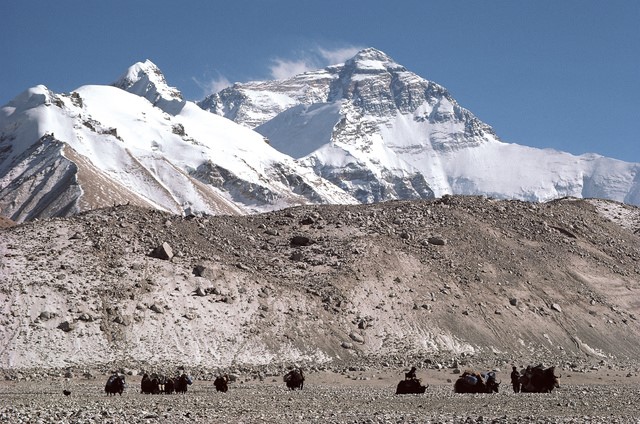
Both the EBC and ABC Treks have spectacular views, but they are not the same. Each has its unique sights that attract tourists.
Scenic views en route to Everest Base Camp
Major attractions during the Everest Base Camp Trek:
- Iconic Mountains: Trekkers can see the wide views of Ama Dablam, Lhotse and Mt. Everest from different places.
- Kala Patthar: One of the most spectacular viewpoints that affords a superior sunrise view of Everest-one that is special to most hikers.
- Diverse Landscapes: The trail passes via pine forests, the valleys of the rivers, and pictorial villages, including Namche Bazaar.
Beautiful Views on the Advanced Base Camp Route
The Advanced Base Camp Trek is special, with rough views that seem like another world. Important highlights are:
- North Face Views: ABC captures the close view of the steep north face of Mount Everest.
- Rongbuk Glacier: Trekkers pass beside this massive glacier, making the hike even more thrilling.
- Tibetan Landscape: The route presents a combination of empty lands, snowy mountains, and calm monasteries.
Required Permits: for Everest Base Camp Vs Advanced Base Camp
You need special permits and some planning to trek to Everest Base Camp (EBC) or Advanced Base Camp (ABC). These documents make sure that your trip is safe and legal. The following are the permits that you will need for each of the treks.
Permits for Trekking to Everest Base Camp
If you’re trekking to EBC, here are the permits you will need:
- Sagarmatha National Park Permit: This allows entry into the protected area.
- TIMS Card: The Trekker’s Information Management System (TIMS) card keeps track of trekkers in the region.
- Khumbu Rural Municipality Permit: This is an additional local permit required for the EBC region.
How to Obtain These: Most permits can be purchased in Kathmandu or at checkpoints on the trail. You will need passport-sized photos and some cash so make sure that you carry some of your photos with you.
Travel Regulations and Permits for ABC in Tibet
Trekking to ABC in Tibet requires more permits and arrangements. Here’s what’s needed:
- Tibet Entry Permit: It is required for entry into Tibet.
- Restricted Area Permit: Trekking around Advanced Base Camp needs special permission.
- Group Travel Permit: You must be part of an organized group tour led by a licensed operator.
Preparing for Your Trek: Gear and Health Precautions
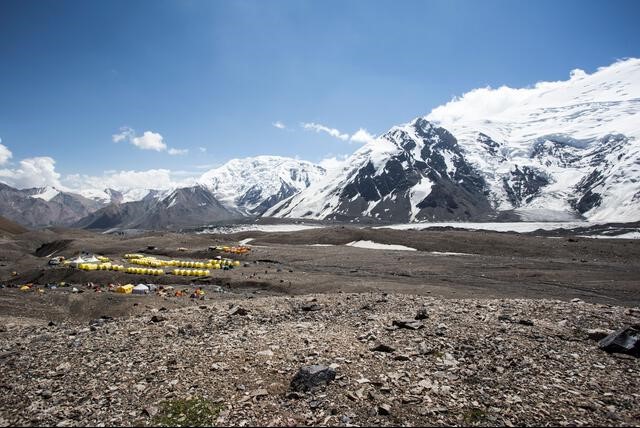
High-altitude treks like Everest Base Camp (EBC) and Advanced Base Camp (ABC) require proper essentials and preparation. You must choose the right gear and health precautions that will make your adventure safer and more comfortable.
Essential Gear for EBC and ABC
Packing the right gear is crucial for both treks, especially for the harsher conditions on ABC. Here is a list of perfect clothes and tools that you need to carry during your trek.
Clothing
| S N | Clothing Type | Essentials |
| 1 | Bodywear | Waterproof Pants And Jacket, Hiking Shorts, Rain Gear, Hiking Pants, Underwears, Bralette, Down Jacket, Thermal Tops And Trousers |
| 2 | Handwear | Waterproof Gloves, Mittens, Light Gloves, Fleece Gloves |
| 3 | Footwear | Running Shoes(Optional), Slippers, Graiters(Optional), Cotton Socks, Hiking Socks, Trekking Boots |
| 4 | Headwear | Balaclava, MuffsScarf, Beanie Hat, Neck Warmer |
Tools and Equipment
- Trekking Backpack
- Water Bottle
- Small Locks
- Raincoat
- Torchlight
- Trekking Poles
- Sleeping Bag
- Sleeping Bag Liner
- Duffel Bag (90-100L)
Toiletries And Personal Hygiene
- Soap/Body Wash
- Toilet Paper
- Tissues
- Face And Body Moisturizer
- Deodorants
- Towel
First Aid And Medicines
- Cough Syrup
- Painkillers
- Antidiarrheals
- Altitude Sickness medicines (prescribed by doctors)
- Insect Repellent
- Skin Blister Repair Kit
- Water Purification Tablets
- Hand Sanitizer
Miscellaneous Items
- Power Bank
- Camera
- Plastic bags
- Universal Adapter
Extras
| Men | Women |
| Razor and shaving cream | Menstrual cups |
| After shave lotion | Shaving kit |
| Pee bottle | Sanitary napkins |
| Small mirror | Urinating device |
Strategies to Prepare the Body: Everest Base camp Vs Advanced Base Camp
EBC and ABC treks are strenuous expeditions and hence it important to prepare the body to avoid any health issues during the journey. Here’s how to train effectively:
Build Cardiovascular Endurance
Activities such as running, cycling, or swimming will all improve aerobics endurance. Aim to work for 30-60 minutes, 4-5 times a week, to improve your stamina.
Strengthen Your Legs
To ease the steep ascents and descents leg exercises such as squats, lunges, and step-ups should be performed. During this stage of training, try to carry a backpack.
Improve Core Strength
Maintaining balance and stability on rugged trails can be enhanced through performing planks, crunches, and other core work.
Acclimatize with Altitude
Training at higher altitudes will be beneficial as it prepares the body to lower amounts of oxygen.
Stretch and Stay Flexible
To reduce muscle soreness and help in recovery, incorporate yoga or stretching exercises.
Work on Mental Toughness
Focus on training your mind to deal with long days in tough conditions by visualizing what success looks like while maintaining a positive viewpoint.
Best Time to Hike to EBC and ABC: Seasons and Weather
Choosing the right time to trek to Everest Base Camp or Advanced Base Camp is vital for an enjoyable trip. Each base camp has certain times of the year when the best weather, views, and overall experience can be guaranteed.
Best Times to Trek to Everest Base Camp
The Everest Base Camp Trek is most enjoyed during these times:
Spring (March-May)
This time has clear skies and blooming rhododendrons. Days are warmer, and nights are not too cold.
Autumn (September-November)
Autumn gives the best views of mountains covered in snow. The weather is dry, and the paths are not very slippery.
Note:
Weather Conditions: The temperatures remain moderate which makes the trek quite easier without much heat or cold.
Best Times for Advanced Base Camp
Just as the the trek to Everest Base Camp, the best times to trek to the Advanced Base Camp are also in Sring and Autumn. However, here the conditions are harsher and require more planning.
Spring (March-May)
This is perhaps the best season for ABC. The weather remains steady throughout, and it is a little warmer at higher places.
Autumn (September-November)
Clear skies give amazing views of Everest’s north face, but the cold can be very strong.
Note:
Extreme Weather: ABC has much colder nights than EBC. Always be prepared for freezing temperatures.
FAQs
What is the main difference between Everest Base Camp and Advanced Base Camp?
The major difference between EBC and ABC lies in their altitude and location. EBC is at 5,364 meters in Nepal, whereas ABC is at 6,400 meters in Tibet, which requires more technical skills and preparation.
Do I need technical climbing skills for the EBC trek?
No, there are no specific climbing skills that you need to learn to be able to go on the EBC trek. The EBC trek is a high-altitude trek for fit individuals who can adapt to the higher altitude easily.
Is Advanced Base Camp suitable for beginner trekkers?
No, in ACB this is not suitable for a novice. It has extraordinary physical fitness requirements, as well as experience of heights and technical skills due to icy ground.
How do I prevent altitude sickness while trekking to EBC or ABC?
Ascend slowly, drink lots of fluids, take acclimatization days, and if your doctor recommends, taking medicines like Diamox can prevent altitude sickness.
Why is trekking to ABC considered more challenging than EBC?
The elevation and altitude of ABC with less air, extremely old temperatures, and difficult rocky terrains make trekking in ABC immensely more difficult than EBC.
Everest Base Camp Vs Advanced Base Camp, which one should I do?
Choose Everest Base Camp for a good cultural trek with great views and moderate difficulty. Choose Advanced Base Camp if you want a challenging, tougher and harder high-altitude adventure with fewer people around.

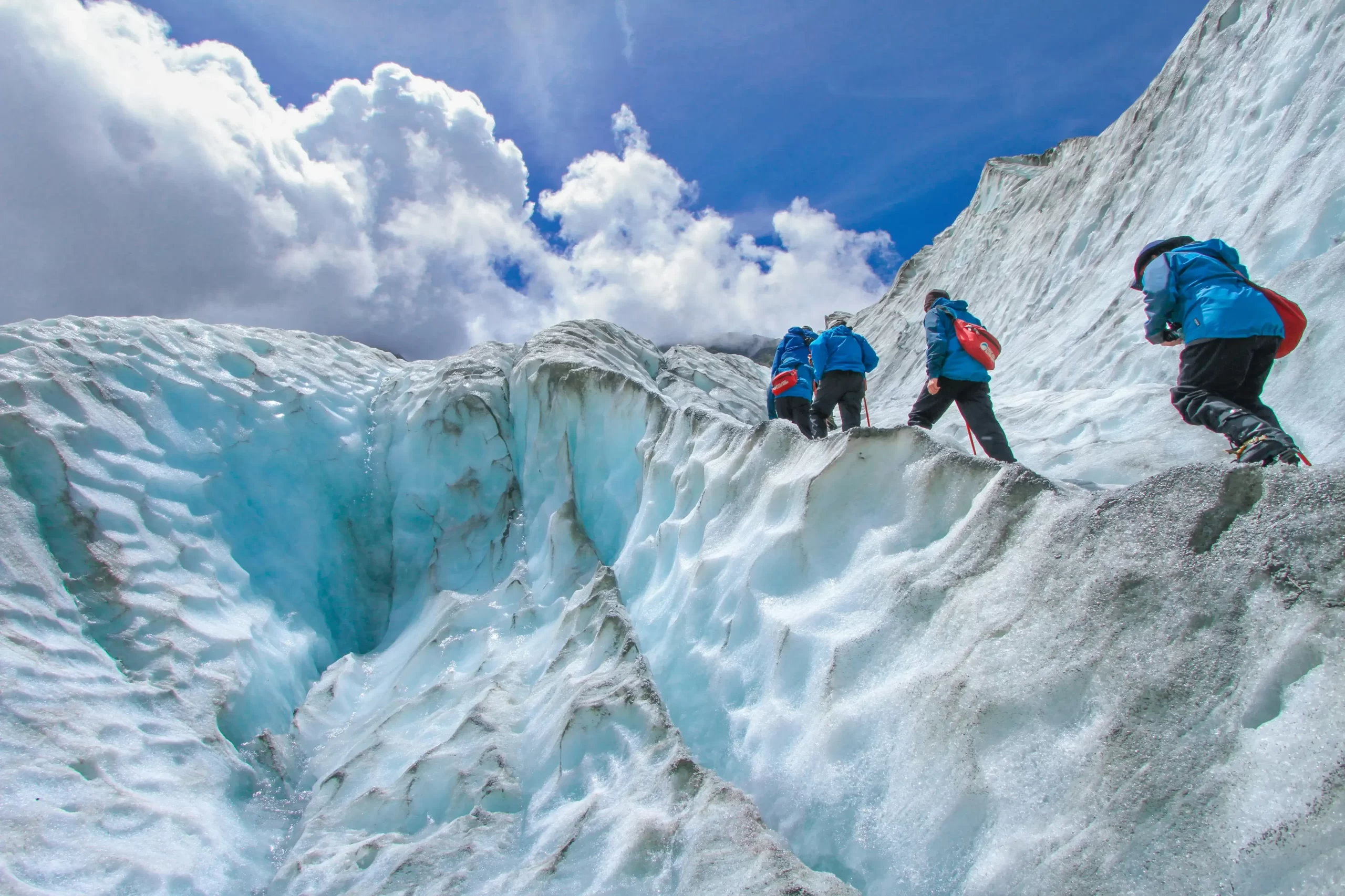
Recent Comments